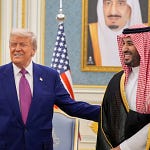Thanks for joining Danielle Pletka and I for our special coverage of the UN General Assembly. If you didn’t have a chance to watch us live yesterday, here is the video and here is the video of our UNGA show on Tuesday. We plan to do more special editions of Hot Takes Happy Hour for big and breaking stories. Let us know what you want to hear about.
I’m wrapping up a week in New York for the opening of the United Nations General Assembly. UNGA, as it is not-so-affectionately know, has been called the diplomatic equivalent of speed dating - lots of meetings, little substance. But this week’s gathering revealed something more nuanced about how the international community has adapted to Donald Trump’s return to power: they’ve learned to separate the performance from the policy, and increasingly, they can live with both.
I met with a lot of diplomats this week in New York and found Trump’s combative speech to the General Assembly wasn’t the bombshell many expected. Diplomats have heard the routine before - the attacks on climate policy, the immigration rhetoric, the grievances about whatever. What matters more to them now is what happens in the bilateral meetings, the private conversations, and the concrete policy shifts that emerge from Trump’s mercurial decision-making process. And on that front, many are cautiously optimistic.
The price of access
Make no mistake: the current dynamic requires a level of diplomatic genuflection that makes many seasoned ambassadors uncomfortable. World leaders have spent much of the year learning how to appease Trump, understanding that embarrassing him publicly would be counterproductive. It’s the kind of careful choreography you’d expect around an unstable autocrat, not the leader of the free world.
This represents a fundamental shift in how international relations operate. Traditional diplomatic norms - the careful language, the multilateral consultations, the respect for institutional processes - have given way to a more transactional approach centered on personal relationships with one man. It’s undignified, and many diplomats privately bristle at having to navigate Trump’s ego alongside complex policy issues. But they’ve also discovered it can be surprisingly effective.
The key insight driving diplomatic strategy is brutally simple: Trump sets the tone, everyone needs him, and he knows it. This isn’t the Trump of 2017-2021, when world leaders thought they could manage or manipulate him. This is a more confident Trump who has consolidated power and demonstrated staying power. Resistance is futile; adaptation is essential.
Trade wars that aren’t
One area where diplomats express genuine relief is trade policy. Trump’s threats of universal tariffs and trade wars had many fearing a return to 1930s-style protectionism. While Trump has indeed imposed significant tariffs - including what he calls “major tariffs” on Brazil in response to their treatment of former President Jair Bolsonaro- the damage has been more targeted than his campaign rhetoric suggested.
The reality is that Trump’s bark on trade has often proved worse than his bite, at least for allies willing to play the game on his terms. Countries have learned to offer symbolic victories—increased defense spending, energy purchases from the United States, diplomatic support on key issues—that allow Trump to claim wins while avoiding the kind of comprehensive trade war that would devastate the global economy.
The Ukraine surprise
Perhaps the most significant development for European diplomats has been Trump’s evolving position on Ukraine. His meeting with President Volodymyr Zelenskyy this week marked a dramatic shift from earlier suggestions that Ukraine should cede territory for peace. Trump’s social media post declaring that Ukraine could “fight and WIN all of Ukraine back in its original form” represented exactly the kind of strong American support that European allies had hoped for but hadn’t expected.
But here’s the catch: Trump’s history of policy reversals raises serious questions about whether this shift will hold. His statement that NATO can “do what they want” with American weapons suggests he may be stepping back from direct involvement while allowing others to escalate support. Which NATO ally will seriously plan long-term strategy around commitments that might reverse with Trump’s next social media post?
Middle East balancing act
On Gaza and the broader Middle East, Trump’s approach has earned grudging respect from Arab and Muslim leaders. His promise not to allow Israel to annex the West Bank addressed a key concern among regional partners, while his criticism of Israeli settlement expansion as “counterproductive” suggested a more balanced approach than many expected.
Trump’s emphasis on hostage releases and his pressure on both sides to reach a ceasefire deal has been welcomed by regional powers who see American engagement as essential to any sustainable resolution. While his methods may be unorthodox - including his apparent surprise at Israeli strikes in Qatar - the substantive positions he’s taking align with regional diplomatic priorities.
A pragmatic accommodation
What emerges from conversations with diplomats this week is a picture of pragmatic accommodation. They may not respect Trump’s methods or appreciate his treatment of multilateral institutions, but they can work with his positions on key issues. The theatrical elements of Trump’s presidency - the rambling speeches, the personal attacks, the institutional vandalism - are treated as background noise to be endured rather than engaged.
This represents a remarkable adaptation by the international community. Rather than fighting Trump’s approach to diplomacy, they’ve learned to work within it, discovering that beneath the chaos and spectacle, there are deals to be made and interests to be protected. It requires patience, flattery, and a willingness to endure public humiliation, but it can produce results. On the issues that matter most—trade relationships, Ukraine support, Middle East stability - Trump’s positions are within the bounds of what they can work with.
The concern, of course, is what this means for the broader international order. The normalization of Trump’s approach may have short-term benefits for specific countries, but it undermines the institutional frameworks that have underpinned global stability for decades. Diplomats understand this trade-off, but in a world where Trump controls American power, they’ve concluded that adaptation is preferable to isolation. The price of access may be high in terms of dignity and institutional norms, but the alternative - being shut out of American decision-making entirely—is worse.
This doesn’t mean they’re comfortable with the broader trajectory of American leadership. Many express private concerns about America’s democratic institutions, political polarization, and attacks on press freedom and political opponents. But in the immediate term, they’re focused on managing the relationship they have rather than longing for the one they wish they had. For now, diplomats are keeping their heads down and trying to plow ahead, making the best of a situation they didn’t choose but can’t avoid.
The world has learned to live with Trump. Whether it can thrive under his leadership remains an open question.
SHOW NOTES
At UN, amid jeers and cheers, Netanyahu says Israel ‘must finish the job’ against Hamas in Gaza (Associated Press, Sept. 25, 2025) Video of Netanyuahu’s address
‘Palestine Is Ours,’ Abbas Tells U.N. General Assembly (New York Times, Sept. 24, 2025) Video of Abbas’ address
Elise’s piece: “The hunt for a Palestinian Plan B (Cosmopolitics, Jan 26 2024)
Dany’s piece, Enough with the Gaza Famine Canard (National Review, Sept. 5, 2025) and The Pretend State of Palestine, (What the Hell is Going On podcast with Elliot Abrams) Sept. 11, 2025)
SU fraternity calls attack on Rosh Hashanah an ‘act of ignorance, intolerance and hatred’ (Syracuse.com, Sept. 25, 2025)
James Comey, Former FBI Director, Indicted After Pressure From Trump, (New York Times, Sept. 25, 2025)
Why More Adults Than Ever Are Being Diagnosed With Autism (Wall Street Journal, (May 25, 2025)
Trump statement at odds with Hegseth’s directive about press access to the Pentagon (USA Today, Sept 22, 2025)
Thank you David Galinsky, Los Gatos Sin Madrid, Lana, Gary Sorensen, lotta kuylenstjerna, and many others for tuning into my live video with Danielle Pletka! Join me for my next live video in the app.














